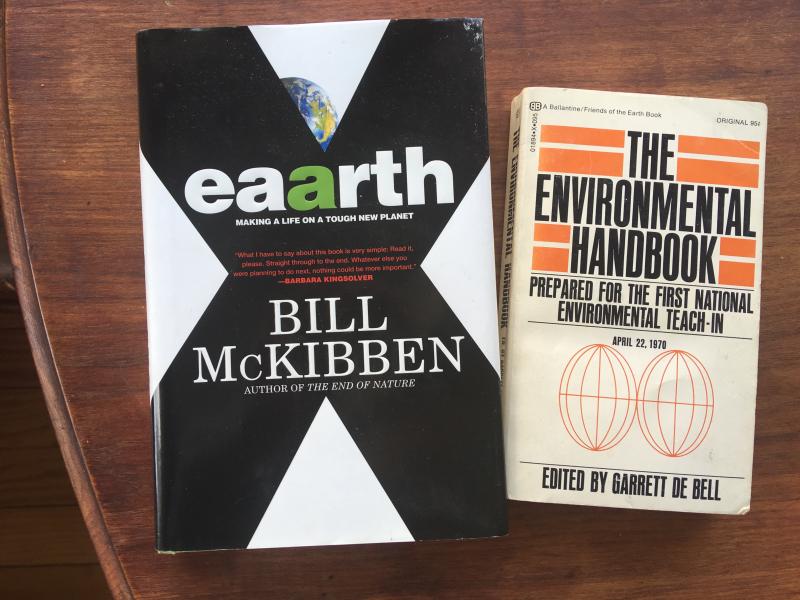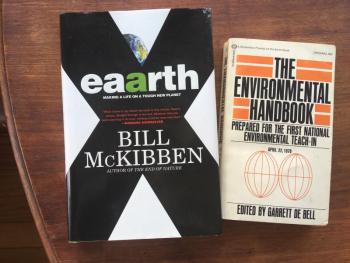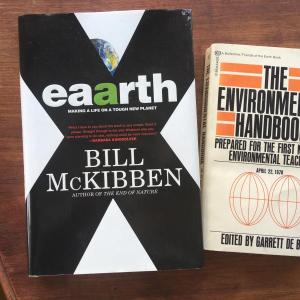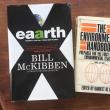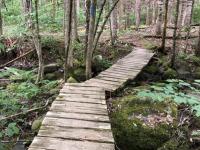Why Earth Day Matters
Earth Day is pretty special for me, since daughter Chelsea was born at home on April 22 in 1986. We celebrated with a champagne breakfast.
This Earth Day, I’m not feeling too celebratory.
On the very first Earth Day in 1970, I picked up trash along a highway in Vermont. I was young, idealistic, expecting we'd save the planet. I still pick up roadside trash, but I've lost some idealism.
An estimated 20 million people, one in 10 Americans, participated in the 1970 Earth Day, the inspiration of Wisconsin Democratic Senator Gaylord Nelson. Thanks to him and Senator Edmund Muskie of Maine, the Clean Air Act and Clean Water Act became very effective law. Sadly, the current Administration is reversing the environmental gains of the past half century.
Scientists today assure us we are now basically going to hell, based on catastrophic warming of the atmosphere, melting glaciers and sea level rise, and pollution from our use of fossil fuels. Many species are going extinct. Those of us who worry about saving the planet often focus on the actions of President Donald Trump, a dedicated climate-change denier. In fact it's not just Trump. Our nation has simply not done enough to head off climate catastrophe, and we see the results in destructive storms and droughts.
When Jimmy Carter was President, we reduced highway speed limits, promoted solar (including panels on the White House) and urged conservation. President Ronald Reagan undid some modest gains, and removed those solar panels, which wound up at Unity College.
In 1969, while working at the original Barnes & Noble in New York City, I bought The Environmental Handbook, for the first Earth Day. It’s a call to action and it credits a youth movement (we’re now old) for leading the charge. In the book, John Gardner, Common Cause founder and cabinet secretary under President Lyndon Johnson, told the National Press Club, "We are anxious but immobilized. We know what our problems are, but seem incapable of summoning our will and resources to act.”
"We know our lakes are dying, our rivers are growing filthier daily, our atmosphere increasingly polluted. We are aware of racial tensions that could tear the nation apart. We understand that oppressive poverty in the midst of
affluence is intolerable,” Gardner said.
Ten years ago, environmentalist Bill McKibben, founder of 350.org, wrote a book called Earth, Making A Life on a Tough New Planet. He doesn't mean we'll find another planet to inhabit. He means we mustn't give up on this one. The "tough" part is that it's now too late the preserve the earth we have known it. We have already lost that fight, he said. He warns,”If we don't stop pouring more carbon into the atmosphere, the temperature will simply keep rising, right past the point where any kind of adaptation will prove impossible." That means kiss our lives goodbye.
I wonder how many more birthdays Chelsea will have, and what future my seven-year-old grandson Sylvan will face. The Environmental Handbook pointed out we were, in 1970, in a crisis.
Are we doomed? McKibben, whose brother once taught in a one-room school on Matinicus Island, said, ”The momentum of the heating, and the momentum of the economy that powers it, can't be turned off quickly enough to prevent hideous damage. But we will keep fighting, in the hope that we can limit that damage.”
Pioneer environmentalist Rachel Carson, who had a cottage in Southport, called out corporations for selling toxic chemicals and woke us up to environmental destruction. That was 70 years ago.
"Man is a part of nature, and his war against nature is inevitably a war against himself,” she said.
Carson is long gone, and now we have Greta Thunberg, an inspiring Swedish girl who is the environmental conscience of the world. Last year she told the World Economic Forum, "I want you to act as if the house is on fire, because
it is."
On Earth Day, I will be grateful for the soft wind and longer daylight, when hope itself can spring anew, and the peepers sing in the pond. My family will plant a peach tree.
Steve Cartwright is a retired newspaper editor and reporter. He lives in Tenants Harbor
Event Date
Address
United States

